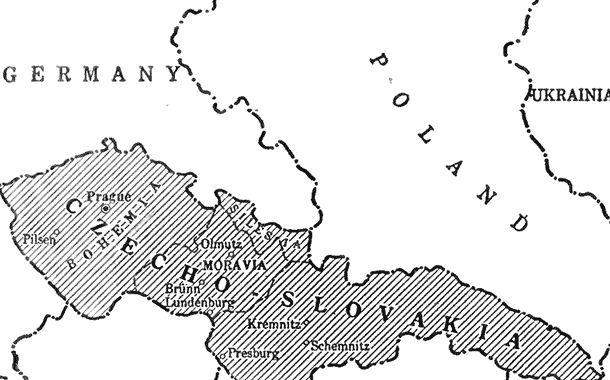<![CDATA[On the 30th September 1938, the Munich Pact was signed between the leaders of France, Britain, Italy and Germany. The agreement stands out as the defining moment in the policy of appeasement towards Hitler's belligerence and expansionist desires. This failed policy aimed to prevent a war in Europe by making small territorial concessions to Hitler, in the hope of sating his ambitions. The agreement officially handed over control of the Sudetenland from Czechoslovakia to Germany, on the basis that the region had a population of over three million ethnic Germans. The move was incredibly disruptive to Czechoslovakia however, with the Sudetenland containing 66% of Czechoslovakia's coal, 70% of its iron and steel and 70% of its electricity output. In addition, Czechoslovakia's loss was of course a tremendous boon to the German economy and war machine. In reality, the Munich Pact left the whole of Czechoslovakia at the mercy of German expansion. The Czechoslovak government had a treaty with France, and was relying on military assistance from its ally to deter the German threat. The country also had an alliance with the Soviet Union. The Munich Pact revealed a brutal reality to the Czechoslovak people - their allies were not willing, or not able, to come to their assistance. The Soviet Union had indicated a willingness to cooperate with Britain and France in aiding Czechoslovakia, but would not confront Hitler on its own. The Munich Pact can therefore be seen as a key cause for the USSR signing the Molotov-Ribbentrop Pact, suing for neutrality with Germany as it became sceptical of the chances of support from the Western powers. The Munich Pact was agreed between Neville Chamberlain, the Prime Minister of Great Britain, Edouard Daladier, the French Premier, Benito Mussolini and Adolf Hitler. With hindsight, the actions of Daladier and Chamberlain seem misguided, sacrificing Czechoslovak self determination in exchange for what turned out to be an incredibly short lived peace. The appeasement policy, rather than quenching Hitler's desire, bolstered his confidence. The following summer war was declared between France, Britain, and the Axis powers anyway, but Germany had got a head start and already made significant territorial and resource gains in Eastern Europe. Nevertheless, in 1938, Chamberlain and Daladier left Munich to find their respective countries in celebratory moods. Chamberlain was confident, and announced to the British public the pact ensured "peace with honour, peace in our time". Of course the positivity was not universal and Chamberlain's rival for power in Britain, Winston Churchill, announced "You were given the choice between war and dishonour. You chose dishonour and you will have war." At least initially though, the people of Britain and France seemed relieved that war had been diverted. In the context of the time this is understandable. Both countries were still feeling the effect of the First World War, with the horrific loss and disruption of the conflict still fresh in the memory. A return to this level of destruction was something Europeans were desperate to avoid. On a more practical level, both Britain and France were aware of their limitations at the time, and realised that entering a war with Germany in September 1938 was likely to have had devastating effects. By March 1939 Hitler had annexed the rest of Czechoslovakia, highlighting the failure of appeasement. In September 1939, Poland was invaded, and the great powers of Europe were at war with each other for the second time within half a century. Appeasement had postponed war, but not prevented it. The goodwill Chamberlain received in 1938 quickly disappeared and he lost all credibility as a politician. His intentions in the Munich Pact may have been a sincere attempt to prevent horrific war, but history remembers him, and Daladier, as the politicians who failed to recognise the threat posed by Nazi Germany. ]]>
The Munich Pact
